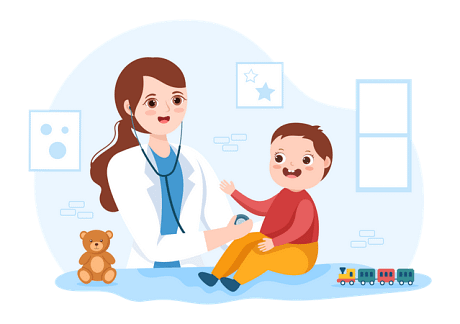
What to Expect During Your Baby’s Seventh Well-Child Visit (12 Months Old)
At 12 months, your baby is reaching an exciting milestone—turning one! This well-child visit will focus on key developmental areas like growth, nutrition, safety, and communication skills. Below are the 33 key points you can expect during this visit:

35 Key Points to Expect During the Seventh Well-Child Visit
- Identify New Risk Factors
The doctor will assess any new risk factors related to the baby, parents, or environment. - Discuss Baby’s Diet
In addition to breastfeeding, the doctor will inquire about the baby’s diet, focusing on the quantity and quality of food. If concerns about food fussiness are expressed, they may observe feeding. - Ask About Screen Time
The doctor will discuss your baby’s screen time, if applicable, and offer advice on managing it. - Ask About Sleep Hygiene
Sleep routines and quality will be reviewed, and guidance on good sleep hygiene will be provided. - Childproofing Discussion
You’ll be asked about childproofing measures in your home, including sleeping areas, furniture, and play zones, as well as ensuring toys are safe for your baby. - Measure Growth
Your baby’s weight, length, and head circumference will be measured and plotted on the growth chart to track their development. - Check the MCP Card
The doctor will review the completed MCP card (Green/Red zone). If not filled out, they will complete it with the mother and interpret the findings. - Encouraging Independence
Parents will be asked whether they involve the baby in tasks like feeding and dressing/undressing. - Assess Parent-Child Attachment
Observations will be made regarding the quality of attachment and the parent’s responsiveness to the baby’s cues and movements. - Monitor Baby’s Response to Separation
The baby’s reaction when the parent leaves and returns will be observed to assess emotional and social development. - Observe Play and Interaction
The doctor will observe spontaneous play between the parents and the baby. If needed, they will suggest a play activity. They will also watch how parents talk to the baby and comfort them during the visit. - Review Previous Visit’s Notes
Instructions and notes from the last visit will be reviewed to ensure progress and follow-up on earlier recommendations. - Checklist Review
The office staff’s completed checklist will be reviewed for key points to focus on during the consultation. - Health Concerns
Parents will be asked if they have any specific health concerns about the baby. - Behavioral Concerns
The doctor will inquire about any behavioral concerns and how parents address them. - Parent-Baby Play Interaction
Parents will be asked how they engage in play with their baby, focusing on interaction and stimulation. - Parent-Baby Communication
Parents will be asked how they talk with the baby and promote communication and emotional bonding. - Encouraging Smiles
The doctor will inquire how parents make their baby smile and interact with them to elicit positive responses. - IAP-PSQ-4
This questionnaire will be administered at the end of the consultation to screen for psychosocial aspects. - Growth Chart Interpretation
The updated growth chart will be interpreted to track the baby’s physical development. - Physical Examination
A general physical examination will be conducted to check for signs of anemia, rickets, and tooth eruption. - Systemic Examination
A systemic examination will be performed to ensure the baby’s organs and body systems are functioning properly. - Neurodevelopmental Assessment
If any concerns arise from the MCP card, a neurodevelopmental assessment will be conducted. - Vision Check
The baby’s vision will be checked for squint or other abnormalities, and the red reflex will be reassessed if not done previously. - Hearing Test
A hearing test will be conducted by ringing a bell above and behind the baby’s ear to check responsiveness. - Look for Red Flags of Neglect
The doctor will assess for any signs of neglect or physical, emotional, or sexual abuse. - Counseling on Complementary Feeding
Parents will be counseled on continuing complementary feeding and breastfeeding, while discussing the benefits of a proper diet and consequences of poor nutrition. Self-feeding with finger foods under supervision will be encouraged, and advice on avoiding junk food or sweetened beverages will be provided. - Developmental Stimulation
Parents will be guided on age-appropriate developmental activities, encouraging motor and cognitive skills. - Anticipatory Guidance on Emotional Cues
Guidance will be given on recognizing and responding to the baby’s verbal and non-verbal cues. Parents will also be encouraged to help the child self-regulate inappropriate behaviors using proper tone, body language, and facial expressions. - Promoting Play and Physical Activity
The doctor will advise on creating opportunities for the baby to walk and play using toys that promote movement, such as pull-along or push toys. Messy play with water or non-toxic colors will be encouraged, along with stacking, nesting objects, and scribbling with crayons. - Verbal and Non-Verbal Communication
Parents will be encouraged to name objects, ask simple questions, and respond to the baby’s attempts to talk. Reading nursery rhymes, singing simple songs with actions, and showing picture books to encourage pointing at images will be recommended. - Involvement in Simple Tasks
The doctor will advise involving the baby in simple household tasks and personal care activities to foster independence. - Preventive Health Care and Safety
Discussions on personal hygiene, skin and dental care, and accident prevention will be conducted. Parents will be guided on preventing falls, burns, choking, poison hazards, drowning, and electronic safety. - Danger Signs for Seeking Medical Attention
The doctor will provide parents with key warning signs to look for that require immediate medical attention. - Next Immunization and Vaccination Schedule
Information will be given about the baby’s next immunizations and vaccination schedule, ensuring parents are prepared for future health visits.
This visit will thoroughly address your baby’s overall development while providing you with valuable information on nurturing their growth, ensuring safety, and promoting their well-being.










































